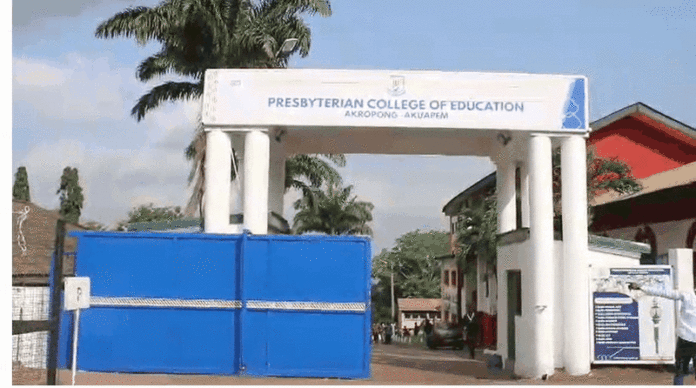Members of the College of Education Teachers Association of Ghana (CETAG) are taking an unyielding stand, calling out the government for inaction on promises made nearly two years ago to improve their working conditions.
In an emotionally charged press conference held independently in Saltpond, CETAG grassroots members openly condemned both government officials and their national leaders, accusing them of sidelining their rights and betraying their trust.
The press conference, organized and funded by CETAG members themselves, reflects a growing schism within the organization as educators grapple with what they describe as a “crisis of neglect” that has gone unaddressed for far too long.
Unfulfilled Promises and a Mounting Sense of Betrayal
CETAG’s grievances center around a long-awaited arbitration award from the National Labour Commission (NLC) on May 2, 2023. This award, secured after protracted negotiations, was supposed to usher in critical improvements, including pay parity with public university lecturers, payment of backdated allowances from 2022, and a comprehensive staff audit by the Ghana Tertiary Education Commission (GTEC).
With the award intended to take effect from January 2023, CETAG members believed they were finally on the verge of justice. But despite the award and repeated assurances from government representatives, these commitments remain unrealized.
“The government urged us to be patient, yet nearly two years later, we are still waiting,” one member voiced at the conference, reflecting widespread frustration among educators who say they are tired of promises that never turn into action.
A Question of Fair Treatment and Dignity
At the heart of CETAG’s demands is their insistence on equal treatment and recognition as tertiary educators. Since colleges of education began offering bachelor’s degrees in 2018, college tutors have met the same rigorous standards as university lecturers, including advanced academic qualifications and publications.
Yet, their wages lag behind. According to CETAG members, assistant lecturers at universities now earn more than the highest-ranked tutors in colleges of education, a disparity they consider an affront to their professional status and constitutional right to fair pay.
The CETAG representatives made their point with clear urgency: “The Constitution guarantees equal pay for work of equal value. This pay gap is not only unfair—it’s deeply humiliating. It tells us that the government does not value the work we do in training the nation’s educators.”
Broken Commitments from Key Government Figures
In an unprecedented move, CETAG members called out high-profile government officials for repeatedly failing to deliver on their promises. The Minister of Education, Dr. Yaw Osei Adutwum, was cited as a key figure who has overseen numerous agreements with CETAG, yet failed to enforce any meaningful change.
The educators also expressed frustration with the Minister of Employment and Labour Relations, who, in 2021, personally encouraged them to end a 72-day strike with assurances that have since gone unmet. Further criticism was directed at the Office of the Vice President, which had stepped in during past negotiations only to provide what CETAG members now view as hollow assurances.
“We feel misled and abandoned by those we trusted to lead,” members expressed. “Every new agreement seems only to delay real progress.”
Dissent Within: Growing Distrust of CETAG’s National Leadership
In a sign of escalating internal division, CETAG members voiced their frustration with the association’s own national leaders, accusing them of aligning too closely with government interests at the expense of their members.
“Our leaders have led us into three strikes, 44 meetings, and still we have nothing to show for it,” members stated, emphasizing that the Saltpond conference was organized by grassroots contributions in response to inaction from the top.
This internal friction underscores a deepening rift, as CETAG members question the commitment of their own representatives to securing fair treatment and pay. “We’ve been patient long enough,” they asserted. “Our national leaders seem to have forgotten us, and we cannot stand by while our rights are ignored.”
Demanding Accountability and Justice
CETAG’s demands are straightforward yet unyielding: they want the immediate implementation of the arbitration award, swift payment of all owed salary arrears, and a completed GTEC audit to address staffing shortages.
If the government remains unresponsive, CETAG members warned that they are prepared to resume strike actions and even escalate the matter internationally. Mentioning potential petitions to bodies like the International Labour Organization (ILO) and the International Court of Arbitration, CETAG’s representatives vowed to hold Ghanaian authorities accountable for what they view as a systemic breach of their rights.
“We are responsible for shaping the educators who will shape the future of Ghana, yet we’re treated as second-class citizens,” members proclaimed, their voices echoing a mounting frustration across the sector. “If our own government refuses to recognize our worth, we will take action to ensure that future educators are treated with the respect we deserve.”
A Crisis Looming Over Ghana’s Education Sector
The fallout from CETAG’s discontent threatens to reverberate throughout Ghana’s educational landscape. As teachers face prolonged struggles for fair treatment and the government remains unyielding, the potential for renewed strikes and increased educator dissatisfaction looms large.
For CETAG members, the stakes couldn’t be clearer. “We are done waiting,” one member concluded. “Our message is simple: uphold your promises or prepare for the consequences.”
As the crisis unfolds, all eyes are on the government to see whether it will address CETAG’s grievances or continue to ignore the demands of the educators entrusted with Ghana’s future.
ALSO READ:

